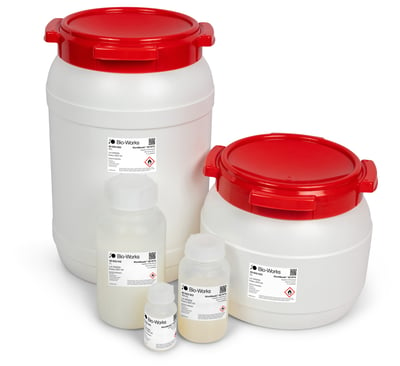Size exclusion chromatography (SEC) resins
WorkBeads size exclusion chromatography (SEC) resins are highly cross-linked, rigid agarose beads optimized for the separation of biomolecules that utilizes differences in sizes and geometries.
Size exclusion chromatography resins
SEC resins that have good flow properties
WorkBeads™ 40/100 SEC, WorkBeads 40/1000 SEC, WorkBeads 40/10 000 SEC, and WorkBeads Macro SEC resins are used for preparative size exclusion chromatography (SEC) in laboratory and process scale purification of proteins, viruses, and other biomolecules by utilizing the differences in their size. These resins are based on agarose, which is a biopolymer suitable for separation of biomolecules. WorkBeads resins are cross-linked using a proprietary method that results in a very rigid structure. Although the general recommendation for SEC is to use a low flow rate for best purification, the rigidity and tight particle size distribution allow for the purification of viruses and other large substances at a high flow rate for fast processing and high yields.
- Produced using a proprietary cross-linking method that results in highly porous and physically stable matrices
- Excellent resolution
- Robust separation results can be achieved across a wide range of proteins and conditions
- Resistant to harsh cleaning agents (NaOH)
- Chemically stable for cleaning in place
We have recently added two new Size Exclusion Chromatography (SEC) products that expand the range for more choice and flexibility in separating large particles. WorkBeads 200 SEC, with 180 μm beads, is suitable for viscous samples like serum and whole blood. WorkBeads Macro SEC resins extend the range of several resins with a bead size of 45 μm but different porosities, making it easy to change between them when different fractionation ranges are desired.
WorkBeads Dsalt resin is designed to enable quick and easy separations of high- and low-molecular-weight substances. This resin is pre-swollen and enables efficient desalting and buffer exchange of proteins, large peptides, and nucleic acids.
Principle of size exclusion chromatography (SEC)
Size Exclusion Chromatography (SEC) is a simple and reliable technique for the separation of molecular components according to their size. The technique relies on a separation resin of porous beads packed closely together in a column. SEC is usually applied as the last purification step (polishing step) since it is limited in flow and sample volume and allows the removal of aggregates of the target substance, buffer exchange, and salt removal.
In SEC, large substances in the applied sample will elute earlier than small molecules since large substances do not enter the pores of the beads, or they can only enter a fraction of the pores. Smaller substances can enter a larger fraction of the pores, and they will therefore elute later. Intermediate size substances will enter the bead pores to different degrees, thus being eluted at different elution volumes. The eluent (buffer) that is used for equilibration of the column will enter completely into the pores of the beads. This means that the substances to be separated will be eluted in the eluent used for equilibration, thus allowing buffer exchange or salt removal (or addition).
WorkBeads give unbeatable results for biomolecule purification
WorkBeads are agarose-based chromatographic resins manufactured using a proprietary method that results in porous beads with tight size distribution and exceptional mechanical stability. Agarose-based matrices have been successfully used for decades in biotechnology purification, from research to production scale, due to their exceptional compatibility with biomolecules, including proteins, peptides, nucleic acids, and carbohydrates. WorkBeads resins are designed for separations requiring optimal capacity and purity.
Don't hesitate to contact us about receiving a sample resin to ensure purification success on your target molecule.